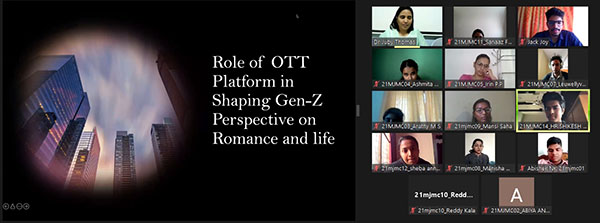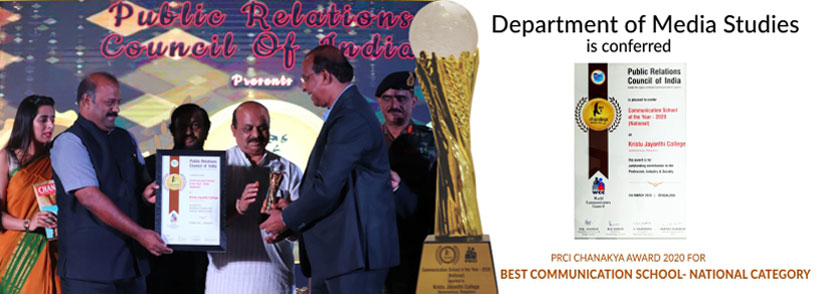
Research
The Fourth Estate, A Qualitative and Quantitative Retrospection Volume 2
Date: 30 March 2023
It was a one-day event organised by the Department of Media Studies (PG) on the 30th of March 2023. The event was a sequel to the previous session Communicare which was conducted by the department on the 23rd of March 2023. All the first and second-year students of MA Journalism and Mass Communication gathered in conference hall 1, PG block for the occasion. They were accompanied by Dr.Juby Thomas, the coordinator of the department, and also the initiator of the two events. The faculty members Mr.Vishnu Achutha Menon, Mr.Ravi Prasad, and Dr.Radhika preceded the event as judges.
The event commenced at 9 am. Dr.Juby Thomas addressed the gathering and welcomed all the students and the judges of the day to take part in the one-day session. The welcome speech was followed by the students’ presentation of their respective research papers. The session comprised six panels, each panel containing three to six first-year students. Each paper presentation was carefully analyzed and judged by the three faculty members. Meanwhile, the final-year students who were the mentors of the first-year students silently observed and examined the presentations.
The event was a great platform created for the juniors to learn how to present their research papers confidently and effectively. It was also a great opportunity for the seniors to learn how to improve their teaching skills and in turn, learn how to prepare and present a research paper better. It was an instrument of learning and improvement for both the first and final-year students.
The event ended with the award ceremony. The award for the best mentor was bagged by Ms.Ashmitha Adhikari, with Ms.Sanaaz Fathima Khan winning the runner-up prize. The ceremony included a photo shoot of the victorious mentors and their mentees and speeches given by the two mentors. The award ceremony also integrated an acknowledgment for the best performances. There were five students in total who were congratulated for best presentations – Shruthi Sikdar, Joicy Olivia Pinto, Shreya Ann Mathew, and Sruthymol Thomas. The Department of Media studies concluded the event at 5 pm, with a will and the wish to carry out more such sessions in the future.
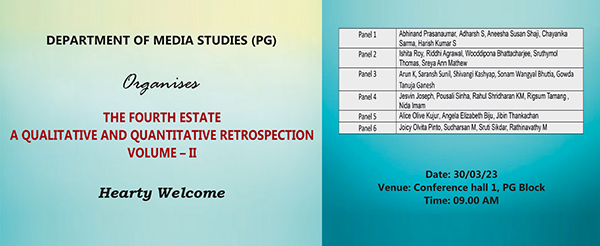
Communicare 2023: A platform for peer teaching
Date: 23 March 2023
The Department of Media Studies (PG) organized a session on peer teaching where the Second year postgraduate students were helping the First year juniors in completing their research papers and preparing the presentations. Communicare is a joined initiation started by the department of media studies (PG) as well as the second-year postgraduate students to enhance the writing and presenting skills of a research paper.
It was an in-house session held between the 1st year and 2nd year postgraduate students under the guidance of the faculty of media studies in Conclave Hall in the administrative block of the college.
The 27 first-year students were divided into 7 groups, each headed by two of their peers. Every group was assigned a faculty member to oversee the smooth functioning of the work. The session was carried out by the mentors of each group where they read through each research paper prepared by the 1st year students. They gave their peers valuable suggestions on how to improve their respective work in the groups they were assigned.
The session was divided into two parts the 1st session dealt with the correction of each research paper. The second session took place post lunch dealing with presentation skills. Each student was asked to clarify their doubts to their respective mentors and to present their research papers in the groups they were assigned to.
The session ended with amazing feedback from the second-year postgraduate students, which helped the first years understand the basic concept required for writing a research paper.
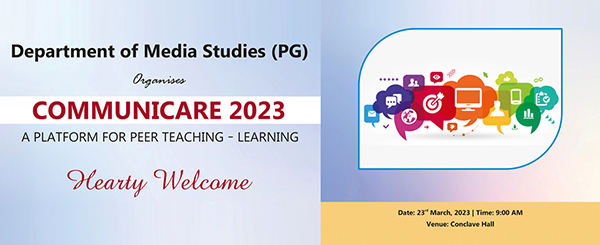
Samshodhan 2022 A National Level Research Symposium on Harnessing Media’s Role in Nation Building
Bengaluru, April 08, 2022 — Samshodhan is an ongoing research initiative by the Postgraduate Department of Media Studies at Kristu Jayanti College, Autonomous, Bengaluru. The department regularly conducts international lecture series, research workshops and faculty development programs for promoting research culture among the budding media scholars. The current edition of Samshodhan caters to undergraduate students. Prof Mrinal Chatterjee was the chief guest for the inaugural ceremony of the research symposium. Prof. Chatterjee works as the Center Head of the Indian Institute of Mass Communication, Dhenkanal. He delivered a speech on “Media & Democracy.”
For a democratic country, access to information is essential. Freedom to read or write is an important element to expose and reveal the truth; ensure the self-development and self-fulfillment of citizens, and to ensure the participation of citizens in a democracy. In other words, Democracy in general terms is understood to be a form of government that is subject to popular sovereignty. It ensures that citizens make responsible, informed, choices rather than acting out of ignorance or misinformation. And information serves as a “checking function” to ascertain that elected representatives uphold their oaths of office and carry out the wishes of those who elected them.
“The media are vital for the creation and the development of a democratic culture in any country. They provide people with information, which influences the process of shaping opinions and attitudes and of making political choices. Therefore, the media must be free, pluralistic and independent, and at the same time, they should voluntarily assume social accountability. On the one hand, it provides the information which the polity requires to make responsible, informed decisions. On the other, it performs a “checking function” ensuring that elected officials uphold their oaths of office and campaign promises and that they carry out the wishes of the electorate,” said Prof. Chatterjee.
Many undergraduate students presented their research papers. Romel Bernard from St Joseph College, Bengaluru won the best paper award for his research paper titled “Online Learning: A New Dimension to Educational System”. “A Study of the Use of Cinematic Soliloquy in the Movie Enola Holmes” by Chayanika Sarma from Kristu Jayanti College (Autonomous) won the second prize. Namitha Dev from Christ University won the third prize for her study titled “Tale of the Shudras: A Content Analysis on the Representation of Dalits in Selected Malayalam Films”.
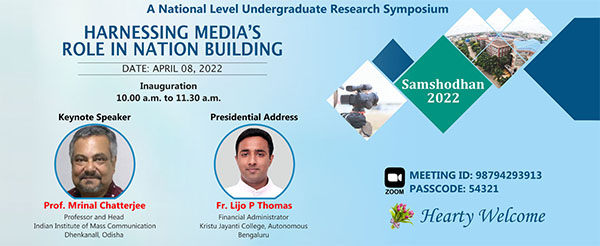
Samshodhan 2022 – An Innovative Approach to Health Communication
Date: 16/02/2022
On February 16th, 2022, the Department of Media Studies (PG) conducted Samshodhan 2022, an online research workshop by Dr. Manual Selvaraj Bexci. The topic for the session was “Media and Public Health Research.” Media Studies (PG) students along with faculties and other external participants attended the workshop. The attendees were given a lecture covering all aspects of health communication.
Dr. Bexci started the workshop with an interactive session to understand the expectations of the participants. She later started the online session covering the fundamentals of health communication and moved to major aspects of media and public health. She also gave tips and suggestions for researchers in the field and briefed them about the scope of working and engaging in this field.
Through her session, the participants received a better picture of the role of media in communicating to people about health and its related concerns. She took up instances from her career and encouraged fellow researchers to put forth the relevance of cultivating health awareness and concrete methods in treatments. She gave glimpses of thousands of articles that are published in the related area of study. She encouraged everyone to use conventional methods for research especially to address the problems of health communication. She mentioned the Four Layer ICT Communication Model which is effective during disasters. Dr. Bexci also quoted the example of the Chennai Flood in 2015 that made use of the model effectively.
Dr. Bexci also talked in detail about the challenges faced by media and public health researchers. The session was relevant in the present times, especially during the situation of pandemics to communicate the role that media plays in communicating about health and medicine. The three-hour-long workshop enlightened the students about the various dimensions in the field of health communication, reporting, and researches.
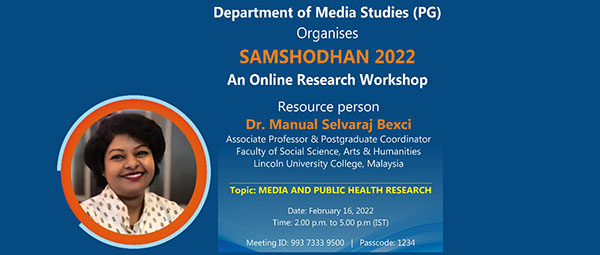
Research Presentation on The Fourth Estate: A Qualitative and Quantitative Retrospection
Date: 09/02/2022
The Department of Media Studies (PG), in association with the Jayantian Media Research Forum, organized “The Fourth Estate: A Qualitative and Quantitative Retrospection” on 09th February 2022. It was headed and organized by Dr. Juby Thomas, Coordinator of Media Studies (PG), Kristu Jayanti College. The event was for 1st Year MA JMC students who presented their research papers on different topics.
The event was the continuation of the 1st series of presentations and it started with the presentation of the research paper by Leuwellyvn M Rozario on "Impact of covid-19 on economic well-being and quality of life among the middle-aged in Bangalore". The study highlights the positive and negative effects among middle-aged people due to covid-19. The study looked into the emotional needs and economic situations of the middle-aged and how important are the mindset and mental pressure during situations like the pandemic. According to the finding, it is clear that covid-19 has created a mentally, emotionally, and physically stressed atmosphere among the middle-aged groups. At the same time, the findings also stated that there are some positive changes due to pandemics as the group has created the habits like cooking, gardening, and involving in charity work, meditation, yoga, etc.
The next research paper was presented by Reddy Kala Pujari. Her research topic was "Role of media in eradicating child labor: A comparative study of Deccan Chronicle and Telangana today". In her study, she provides insight into child labor since it is an ongoing problem that is faced in India. Her study is focused on Telangana. She further gives an analysis of the hard work of the state government to execute new state rules to abolish child labor in the state. Her finding also talks about the children who are the victims of physical and mental abuse, especially during the pandemic. Another important finding of the study was the interpretation in association to pandemics, as many parents went through a huge financial crisis thereby forcing the parents to send their children to work.
The third presenter was Sanaaz Fathima Khan, who presented her paper on the topic "Effect of the Biopic 'Chhapaak' on the lives of the urban women in Bengaluru". The paper gives insight into the true story of acid attack survivor Laxmi Aggarwal. She further presents that, the entire premise of the film centers around Malti's painful journey as an acid attack victim. The study was effective in revealing the life of many Indian women who have undergone the same experience if not of acid attack, in other forms such as domestic violence, sexual abuse, etc. The study helped in understanding the effect of the biopic Chhapaak on the urban women of Bengaluru, as most films today are a source of entertainment. The paper looked into the areas like how urban women perceive certain notions of atrocities faced by women and the role of society towards women's sufferage during traumatic situations.
Ms. Sanaaz presentation was followed by Ms. Irin P.P., who spoke about "Impact of the Malayalam movie 'The Great Indian Kitchen' on Men in Kerala: A quantitative analysis" This study focuses on the Malayalam movie, the Great Indian Kitchen, and its effects on gender issues. This movie completely shows the problems of patriarchal society and the culture of traditional domination that treats women as slaves or subordinates of men. According to her finding, it has been observed that the movie affected men since most of the men agreed with the relatable concepts of the films in the daily lives of women. The study is also a realization that men are against the concepts of patriarchism and they are supportive of women as a motivation to achieve their dreams.
The last paper presenter was Ms. Abiya Annie Varghese, and the title of her paper is "An analysis of the consumption of Covid-19 related news and its effect among the college students". The study focuses on how the pandemic affected the students and the difficulties they faced during the lockdown. The research was also focused on how parents are affected because of the behavioral changes of their children, and the measures they took to help and adjust behavioral changes and needs of their loved ones. According to the finding, it is revealed that children are affected emotionally rather than physically or mentally. The results also revealed the positive engagements where children spend more time with their loved ones rather than engaging with electronic gadgets.
The presentation was effective to understand the wide range of challenges that society encounters during pandemics.The study conducted in different domains revealed the role of media and communication in different areas of engagement. The session was unique with its knowledge consumption and cumulation of ideas that provide hope to open new doors of awareness in the future.
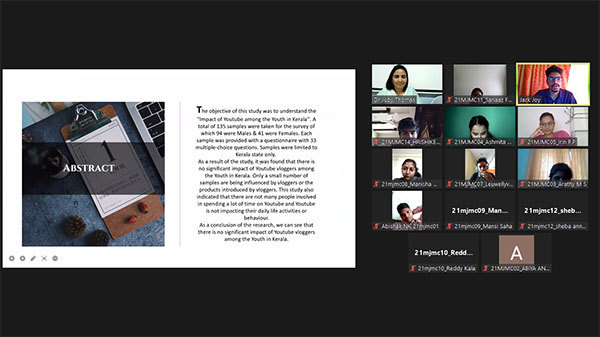
Research Presentation as Part of Jayantian Media Research Forum
The Department of Media Studies (PG), in association with the Jayantian Media Research Forum, organised “The Fourth Estate: A Qualitative and Quantitative Retrospection” on 29th January 2022. It was headed and organised by Dr Juby Thomas, Coordinator of Media Studies (PG), Kristu Jayanti College (Autonomous). The 1st Year MA JMC students presented their papers on different topics.
The event started with Abishek, who presented his paper on the topic “An Analysis of the Portrayal of Scheduled Tribes in the Tamil film ‘Jai Bhim”. It provided insight into how the scheduled castes have been portrayed in the movie Jai Bhim. He had very interesting analysis about the movie, and he came out with suitable parameters. It also looked into the living standard of the scheduled tribes with the other people that have been portrayed in the movie. The study depicted the reality of what is happening to the tribes.
The next paper was presented by Ms. Arathy, who had a quantitative study on “Young adult’s perception about the Malayalam film ‘Home’: A case study of Thrissur.” Her analysis helped to get an idea about the thinking style of this generation towards the people who don’t have any access to the technology. The study also revealed the portrayal of father-son relationships in a Kerala middle-class family. Through her study, it is revealed how the technical generation helps middle-aged people to get access to gadgets and social media platforms.
The third presenter was Ms. Ashmita, and the paper was titled, “Qualitative study on the portrayal of women and substance abuse on Bollywood Item songs”. The paper gave insight into how women are seen as mere objects portrayed only to please men. Item songs are often present in the movie even if it does not connect to the movie’s plot just to attract audience to the theatres or increase the movie’s viewership.
The next presenter was Ms. Sheba, who presented on “The effects of pandemic on the usage of mobile phones among teenagers.” Her study aimed to find the effects of the pandemic on the usage of phones among teenagers in Bengaluru. The relationships have become strained but have not been broken. The study figured out that teenagers use their phones more for entertainment rather than academics.
Ms. Mansi, presented a paper on “Effectiveness of Animation as a tool for communication in school education: A case study of Bengaluru”. She did extensive research on how traditional learning has been used for decades in schools in the form of chalk-and-talk way of learning but, in recent times, many schools have started adopting a digital mode of learning. This trend has accelerated during the pandemic situation. This study indicates that these changes have brought about a positive impact on students’ learning and attentiveness. Animation and other digital tools have also helped teachers in terms of analytics about students’ performance and made this process easier.
Mr. Jack presented his paper on the topic “Vloggers as social influencers: Impact of YouTubers in the life of youth in Kerala”. The objective of this study was to understand the impact of Youtube among the Youth in Kerala. The study found that there was no significant impact of Youtube vloggers among the Youth in Kerala. A small number of populations are being influenced by vloggers or the products introduced by vloggers. This study also indicated that not many people are involved in spending a lot of time on Youtube, and Youtube is not impacting their daily life activities or behaviour.
Mr. Hrishikesh spoke on the influence of the OTT platform and online content in shaping Gen-Z perspective on romance and their new take on life. The rise in popularity of OTT platforms can be significantly seen in the gen-z population, i.e. within the age group of 13-25 years. The research was mainly done to find out how this has affected their perspective on life and see whether people know about this and still do the same. His paper title was “Role of OTT platforms in shaping Gen-perspective on romance and life.”
The event ended with Ms. Manisha’s presentation on “Study on the perception of Covid-19 vaccination among the youth in Bengaluru.” She spoke about how vaccine fear poses a risk to global public health. Since an enormous global effort is ongoing to produce a vaccine to combat the COVID-19 pandemic, little is known about community acceptability. People consider COVID-19 as a dangerous disease, hence demand for a vaccine increased. When deciding whether or not to accept a vaccine, vaccine safety concerns may outweigh perceived disease risks. Those who thought of COVID-19 as a severe disease started to accept COVID-19 vaccine for protection. The study’s goal was to learn about peoples perspectives on the Covid -19 vaccine.
The session was very insightful for all the students, and it was interesting to find out about the different findings each one came out with. The session provided much new knowledge to all the students of II MA JMC.
